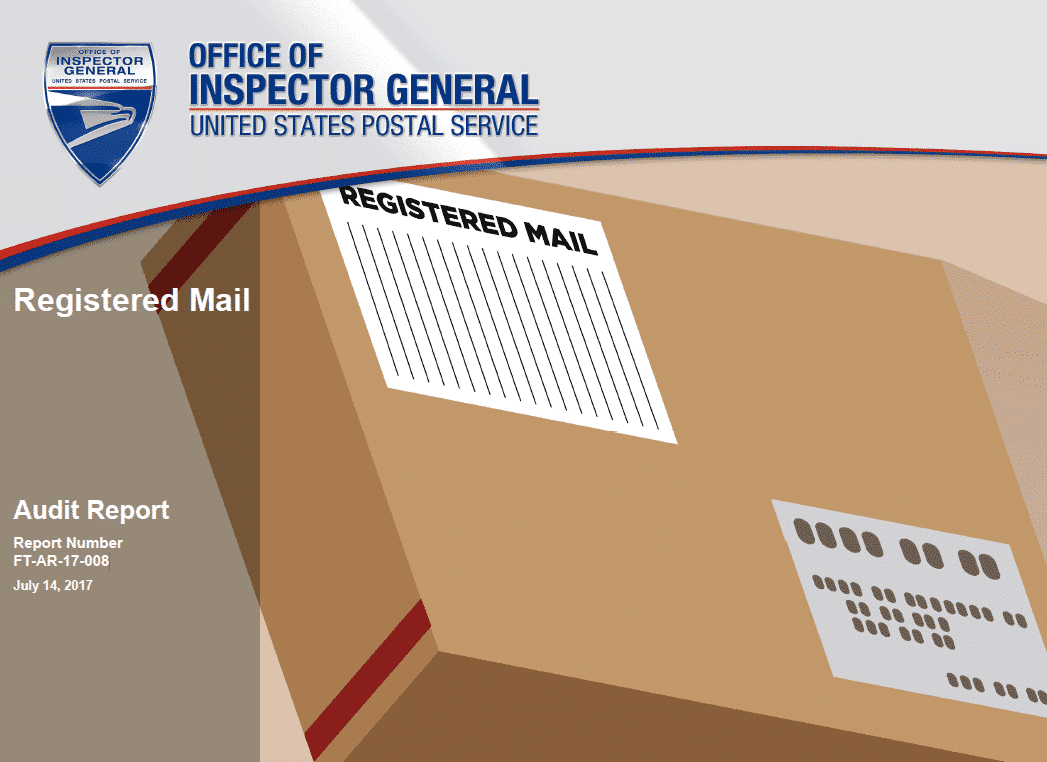
Background
The U.S. Postal Service offers Registered Mail for customers sending valuable or irreplaceable items through the mail. Registered Mail provides added protection for valuable and important customer and internal mail with evidence of mailing and delivery.
Tracking service begins from the time the sender presents the mail to the Postal Service to the point of delivery. An accountable individual must sign for the Registered Mail piece each time it changes hands and each intermediary office must prepare control logs. Registered Mail pieces also require specific packaging and sealing methods for security and protection. When not in transit, Registered Mail pieces must be stored in a locked safe, room, or cage separated from other mail.
During fiscal year 2016, the Postal Service processed [redacted] million pieces of Registered Mail and collected revenue of about [redacted] million.
We used geographical information system mapping, insurance claims, and Registered Mail volume to judgmentally select 15 post offices and two registry sections from four areas for review.
Our objectives were to review current operational controls over Registered Mail for effectiveness, follow-up on prior recommendations from a 2012 audit, and identify potential process improvements and efficiencies.
What the OIG Found
Postal Service operational controls over Registered Mail at 14 of 15 post offices visited were not always adequate, effective, or followed. Some of the post offices had multiple issues such as:
- Six post offices had safes storing Registered Mail and other accountable items that were open and unattended during business hours.
- Two doors to the registry room or cage were open and unlocked when not in use and the safe key was not secure at one of the post offices.
- One post office’s Registered Mail for daily bank deposit was not secured routinely while awaiting dispatch and remittance.
- Six post offices left Registered Mail pieces unattended in an open area.
- Four post offices did not maintain logs recording personnel access to the registry room or cage.
- Fourteen post offices had employees who did not complete required training courses for acceptance, transfer, and security of Registered Mail.
We also determined that the Postal Service did not complete corrective action on prior U.S. Postal Service Office of Inspector General report recommendations related to Registered Mail.
Specifically:
- Two of three post offices in the Southern Area did not provide a step-by-step procedure toolkit to employees responsible for Registered Mail or complete the Registered Mail compliance checklist. Southern Area management agreed to provide a copy of the toolkit to employees in response to a prior audit recommendation.
- Two of nine post offices in the Capital Metro and Western areas did not assess vulnerability and risk associated with facilities, including those related to Registered Mail. Area management agreed to complete the assessments in response to a prior audit recommendation.
As a result of the issues identified, the Postal Service is at an increased risk of delayed mail, theft, or loss which could also increase insurance claims and customer dissatisfaction with the Registered Mail service, potentially impacting its brand.
Further, opportunities exist for post offices and registry section offices to improve the Registered Mail process and efficiencies by implementing evolving technology. These improvements should strengthen information sharing, provide more efficient services, and minimize risks associated with unlocked cages, cabinets, or safes.
What the OIG Recommended
We recommended management verify that employees responsible for Registered Mail complete the required training; monitor Registered Mail operations to ensure employees comply with policies and procedures; update the manual portions of the process; and monitor technology to modernize the Registered Mail process.
Read full report
Source: USPS Office of Inspector General
